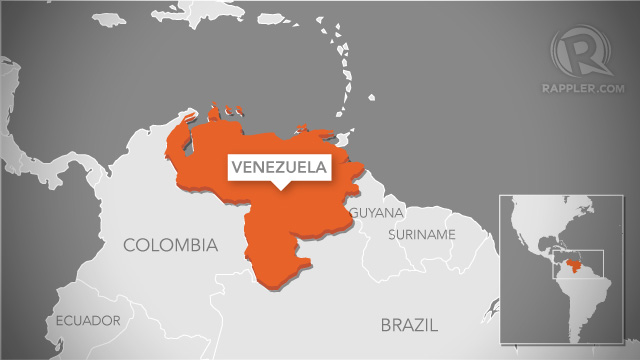SUMMARY
This is AI generated summarization, which may have errors. For context, always refer to the full article.

CARACAS, Venezuela – Nicolas Maduro was sworn in as president of Venezuela on Friday, April 19, replacing the late Hugo Chavez and calling for dialogue with the opposition to build a better country “for everyone, by everyone.”
To cheers in the National Assembly, Maduro dedicated his oath of office to “the eternal memory of the supreme commander” Chavez, who dominated this oil-rich South American country for 14 years until dying from cancer in March.
Maduro, 50, said he wanted to begin his presidency “with a call to all Venezuelan men and women to continue to build a better fatherland of peace, an inclusive fatherland for everyone, by everyone.”
Speaking of the opposition, he said, “I call on them to converse in the different settings where conversations can be held. I am ready to converse even with the devil.”
But the new president also resumed attacks on the opposition, highlighting what has been a week of soaring political tensions since he was declared the winner of Sunday’s snap elections by a narrow margin of 1.8 percentage points.
The new leader’s speech was briefly disrupted when a man in a red shirt rushed onto the stage and roughly pushed Maduro aside to grab the microphone.
National television coverage of the event was suspended, causing momentary confusion until it returned minutes later after Maduro regained his composure and the intruder had been removed from the stage.
“Security has absolutely failed. They could have shot me here,” Maduro complained. Then shaking it off, he added, “Incident overcome.”
Watching the ceremony was a packed assembly with foreign leaders, lawmakers and other dignitaries in attendance.
Close allies Presidents Raul Castro of Cuba and Mahmoud Ahmadinejad of Iran were in the audience, along with the presidents of Brazil, Argentina, Bolivia and neighboring Colombia.
Expanded audit
Maduro had met the night before in Lima with regional leaders who extended their congratulations to the new government and urged all sides in the bitterly contested elections to accept “the official results.”
The endorsement came just hours after Venezuelan election authorities announced they would conduct an expanded audit of Sunday’s ballot returns in response to opposition demands for a full recount.
Opposition candidate Henrique Capriles immediately accepted, congratulating his followers on their “struggle for the truth.”
Violent post-election protests left eight people dead and dozens hurt, igniting a crisis as Maduro and Capriles traded fiery accusations over who was to blame.
For Maduro, the election was the culmination of a political career that took him from one-time bus driver and union organizer to Chavez’s handpicked successor.
“I am the first post-Chavez president in history,” Maduro said on the eve of his swearing-in. The new first lady, Cilia Flores, is a heavyweight in her own right in the ruling United Socialist Party of Venezuela.
But Maduro also lost the votes of hundreds of thousands of Chavez supporters to Capriles, a 40-year-old state governor who lost to the comandante in October by an 11-point margin.
The weak performance suggested Maduro has yet to step out of Chavez’s giant shadow with a mandate of his own.
“Maduro is Chavez’s legacy. To support him is to support the supreme commander,” said Jose Rendo, a 38-year-old electrician who joined hundreds of other Chavez supporters in the nearby Plaza Bolivar for the inauguration.
As Maduro entered the National Assembly, supporters showered him with cheers of “Chavez lives, the struggle continues.”
Social programs
Maduro promises to uphold Chavez’s legacy of ruling in favor of the poorest Venezuelans — nearly 30 percent of the country’s 29 million people — and to maintain the popular social programs funded with the country’s oil wealth.
But while backed fiercely by the PSUV and the deep pockets of Venezuela’s state oil industry, the burly, mustachioed Maduro emerged weakened from the elections, which saw a significant slippage of support among Chavez loyalists.
In a country already deeply divided, he must deal with an emboldened opposition and a military that grew accustomed to playing key political roles under Chavez, a former lieutenant colonel who led a failed military uprising in 1992.
And as president, Maduro faces a somber economic book — soaring inflation, a weak currency, shortages of basic necessities, and fiscal constraints on the extensive social programs that were among Chavez’s signature achievements.
Lacking in Chavez’s magnetism, Maduro nonetheless has taken on major political responsibilities before, serving as speaker of the national assembly, then as foreign minister, and finally as vice president, when Chavez chose him. – Rappler.com
Add a comment
How does this make you feel?
There are no comments yet. Add your comment to start the conversation.